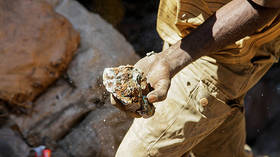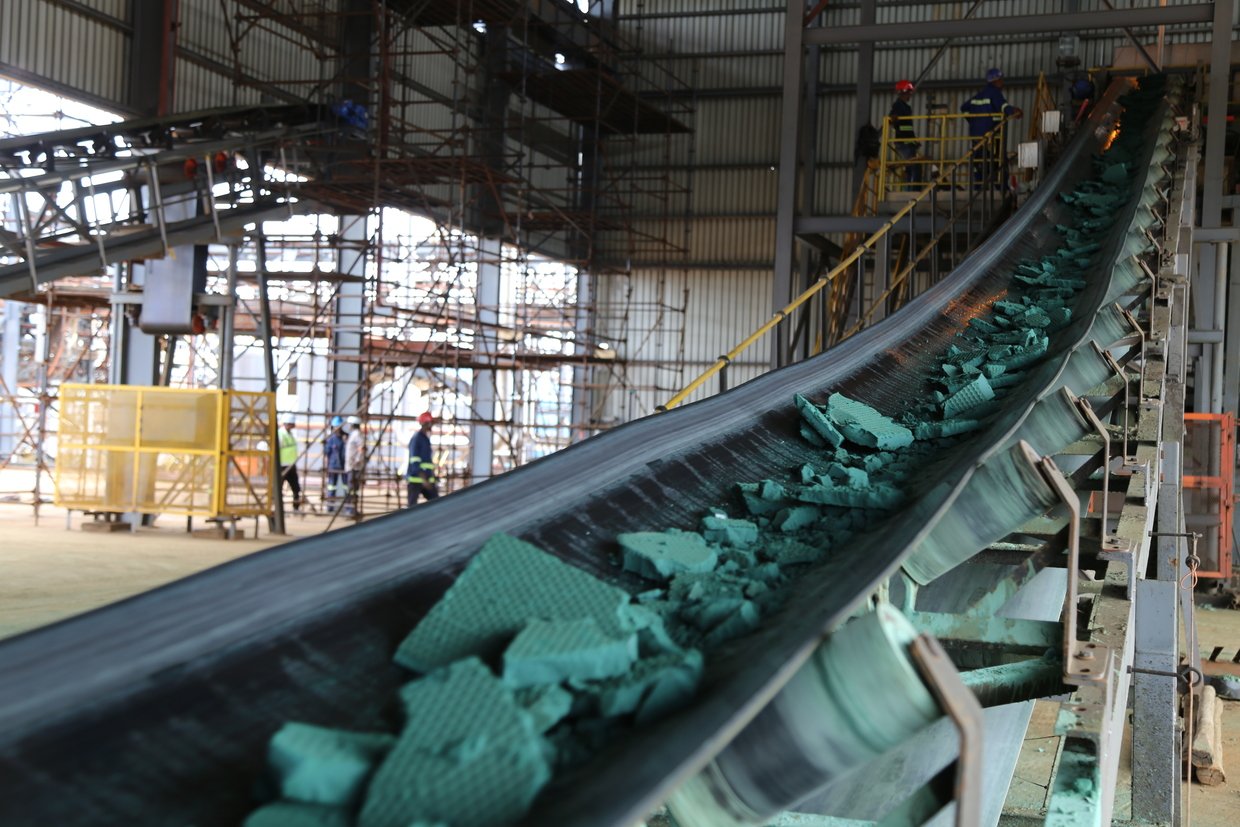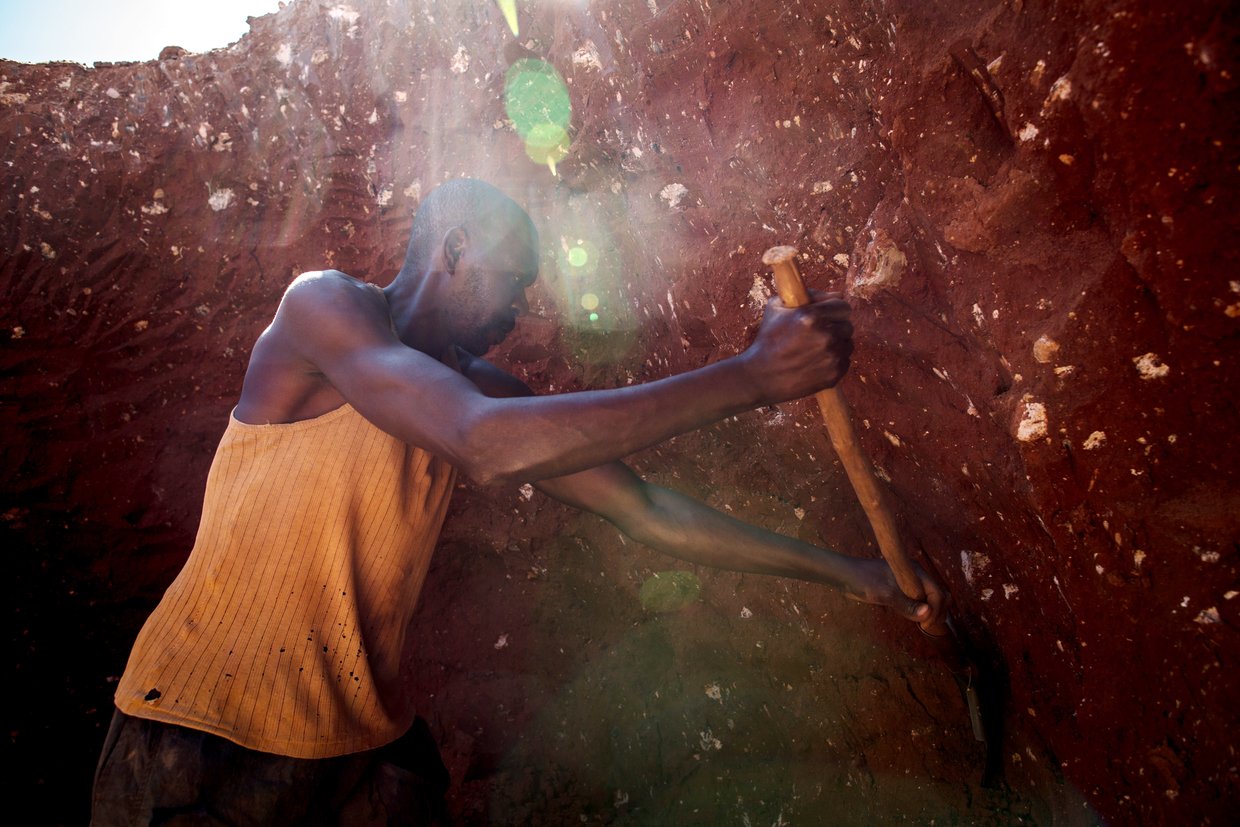How suddenly-precious cobalt that powers Teslas and iPhones also fuels child labor in Africa & armed heists in Europe

It’s an unwanted side-effect of the world’s growing desire for environmentally friendly vehicles: rare metals that are key components of electric cars are becoming prime targets for criminals, as demand sends their values soaring.
How to steal $10 million
On a sunny July weekend in Rotterdam last year, a gang of men pull up in trucks at an unremarkable bonded warehouse situated among an industrial landscape of cranes, shipping containers and depots that sprawls 25 miles along the banks of Europe’s biggest port.
Having purloined the secure codes that give them access through the warehouse’s main gates, they make their way inside and head first to the building’s security unit, punch in the number that disables the alarms and quickly remove the recording unit for the cameras that are aimed at the doors and windows.
Satisfied they are no longer being spied on, they head to a section towards the back of the warehouse and cut the padlock on its sliding door to reveal hundreds of orange and blue drums piled four-high on pallets. All are stuffed full with the prize the men are after: cobalt, a formerly obscure, unwanted metal that, thanks to the electric vehicle revolution, has become a highly desirable commodity nicknamed “blue gold”.
Five or six hours later, the last of the pallets stowed on board their trucks, the gang drives away with 112 tonnes of cobalt, worth around US$10 million. The Dutch police who will investigate when the heist is discovered on the Monday morning spend months failing to catch anyone for the crime or recover any of the stolen goods.

Electrifying demand
Cobalt has become of particular interest to organised crime since its price rocketed by 250 percent between 2016 and 2018 (from about US$26,000 a tonne to more than US$90,000) thanks to demand from electric car manufacturers such as Tesla, Volvo, Ford and Volkswagen, and smartphone makers like Apple.
Its unique qualities prevent lithium-ion batteries in mobiles and electric cars from overheating and going up in flames. More than 50 percent of all cobalt demand is now for battery use, and the EU and the US both class it as a critical raw material.
As electric vehicle production gears up - manufacturers worldwide are investing US$300 billion over the next few years so as to build 35 million electric cars and trucks annually by 2030 - experts believe that the price of cobalt will rise again and make it even more attractive to criminals. According to the prediction of one American cobalt investor: “A wave of demand for copper, nickel, lithium and cobalt is coming that almost no one - miner, investor or banker alike - has anticipated or planned for.”
‘The new gasoline’ fuels abuse
The value of cobalt, which takes its name from the German kobold, or “goblin”, derives from its novel properties and relatively short supply. It is an element that does not occur in a "free" form, but is gathered during the mining of copper or nickel and needs to be chemically prised from them using acids and heat.
For hundreds of years, it was used to impart a distinctive blue tint to glass or ceramics, but in the 20th century scientists discovered it to have qualities crucial to our most advanced technologies. Combined with other metals, it produces alloys that are extremely strong, stable under high temperatures and anti-corrosive for use in aircraft engines, rockets, nuclear power stations, turbines and cutting tools.
However, it is the demand created by its critical role in batteries for electric cars that is not only producing the unwanted attention of criminals, but is also fuelling a human rights crisis involving exploited child labour in one of the world’s poorest countries in Africa.
Around 70 percent of the world’s supplies come from the Democratic Republic of Congo (DRC), which has been beset by decades of war, corruption and unrest. The country is described as being to cobalt what Saudia Arabia is to oil - Goldman Sachs, the merchant bank, has called cobalt “the new gasoline".
Every day, tens of thousands of desperate Congolese, including children as young as four, illegally mine cobalt by hand in horrendous conditions. Unicef estimates that there are 40,000 children working in mines across southern DRC, earning as little as 8p a day to crawl through discarded mines, some more than 100 meters deep, to scavenge for rocks containing cobalt in the discarded by-products.
Reports from Amnesty International and others catalogue frequent injuries and deaths, prompting television and newspaper reports detailing the dreadful human cost. One headline in a British newspaper states: “Child miners aged four living a hell on Earth so you can drive an electric car.”
Campaigners estimate that hundreds of miners die every year or have their health seriously damaged. The hazards include mine collapses such as the one in June this year that killed more than 40 miners working illegally on a site in Lualaba province in south-east DR; asphyxiation due to inadequate ventilation; and illnesses such as the respiratory disease cobalt lung, a pneumonia which can cause permanent incapacity or death.

It’s feared that thousands more children will be sucked into the hellish trade, particularly now that many countries have pledged to ban the sale of new petrol and diesel cars between 2025 and 2040.
Such damaging reports and headlines have forced companies like Apple, Tesla, Volkswagen and Volvo to try to find ways to ensure that the metal they buy is not “conflict cobalt” produced using child labour. One avenue being explored is the use of blockchain technology, the cryptographic tech behind digital currencies like Bitcoin, to ensure traceability.
Thriving black market
It may be difficult to enforce. The rocks that the children find are sold on cheaply to traders, mostly Chinese middle-men who, in turn, ship the cobalt back to their country to be made untraceable; it is smelted down before joining the supply chain that feeds the needs of giant multinationals, and whets the appetite of organised crime gangs in Europe.
Another cobalt heist occurred in 2012 down the coast in Antwerp. Three containers of cobalt had been shipped to a warehouse at the Belgian port. When truckers arrived to pick them up, they discovered that two had already been “collected”; thieves had once again somehow obtained the access codes used for deliveries.
Experts believe that the robberies are being carried out by organised crime gangs who not only know the docks well, but have extensive knowledge of the metal and understand the market for it. “Cobalt is not as fungible a commodity as many believe – this makes it a difficult product to ‘fence’ without a knowledgeable middleman with routes to market,” says George Heppel, a senior cobalt analyst at London-based CRU group, which offers business intelligence on the metals and mining industries.
So what happens to the stolen cobalt? “It is highly unlikely to have made its way into the battery supply chain,” Heppel says. “My best guess is that it was probably sold into the alloy scrap and revert sector to be used in superalloys, speciality steels or diamond tools. It’s more likely to be in a jet engine than a smartphone.”
But whatever the use the black market that exists for scarce and valuable metals like cobalt is thriving. Jan Struijs, the chairman of the Dutch police union and the former head of a criminal investigation squad in Rotterdam, told the business channel Bloomberg that the warehouse robbery there was simply “the tip of the iceberg".
David Weight, the president of the UK-based Cobalt Institute, says: “If something is valuable then it becomes a target. You saw it with copper: when its price was high, people were stealing manhole covers and pulling up electrical cables from the ground - and some were killing themselves doing it. When the price is high, people do the most extraordinary things.”
By Richard Ellis, freelance journalist in the UK
Subscribe to RT newsletter to get stories the mainstream media won’t tell you.
The statements, views and opinions expressed in this column are solely those of the author and do not necessarily represent those of RT.














